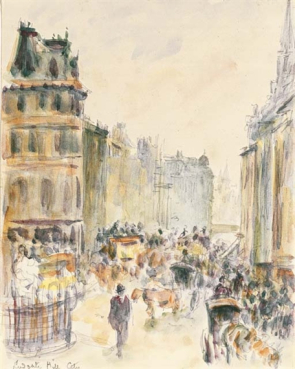
Ludgate Hill by Camille Pissarro, 1890
John Alfred Smith worked for a cheesemonger in the City of London (who had premises on Ludgate Hill), but in October 1890 Smith was summoned before Mr Denham at Wandsworth Police Court, to answer a charge that he had deserted his wife and family.
The prosecution was brought by the Poor law Guardians of Clapham and Wandsworth and therefore fell under Denham’s jurisdiction. Prosecuting, Mr Charter explained that Smith’s wife and her five children had applied for relief on the 30th August of that year.The circumstances of her application are not made clear, but it would seem that at some Smith simply didn’t come home.
What was established was that Smith had run his own business in Battersea but this seems to have collapsed and forced him to seek work elsewhere. With his business in tatters it the man appears to have decided his family was just too much for his pocket to maintain, and he abandoned them to the parish. However, there may have been another reason for his flight: in short, another woman.
Answering the summons before the magistrate Smith made the bold move of denying that he was married to the woman at all. He said no proper marriage had taken place and added that they had never lived together long enough for the relationship to be established as such. One wonders then how she managed to produce no less than five children.
Mrs Smith’s sister was called to give evidence and she described how Smith had taken her sibling, aged just 16, to Brighton ‘on the pretense of marrying her’. While no record of the marriage could be found it seems that there was at least anecdotal evidence of the union. Smith had, his sister-in-law swore, declared on their return that they were married. Mrs Smith also appeared in court to confirm that she was indeed married to the man in dock.
This was good enough for Mr Denham. Regardless of the veracity of her statement or that of her sister he thought it appalling that a woman and five children could be abandoned in such a way. Smith ‘was morally guilty, whether she were his wife or not’. Moreover now it emerged that Smith had taken a new wife since his desertion, ‘a young woman who was suffering from nervous prostration brought about by his arrest’.
So it would seem that Smith had simply had enough of his former life. Abandoning Battersea, his failing business and its debts, and his wife and kids he relocated to the City and found work and a new (and younger) partner. Unfortunately for his attempt to disappear completely failed just as his business had, the state (in the person of the Clapham and Wandsworth Poor Law Union) caught up with him. The magistrate, angered both by Smith callousness towards his family and his blatant disregard for his responsibilities sent him to prison for six weeks at hard labour.
[from The Standard, Friday, October 17, 1890]
Advertisements Share this:





